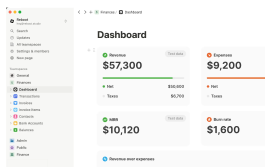Paying for an electronics repair is easy, right? Well, that depends on which side of the counter you’re on.
With so many convenient payment methods — credit card, debit card, and contactless payments — it’s never been easier for customers to pay. However, as a business owner, all of that added choice can make picking a payment processor incredibly confusing.
In this article, we’ll dive into everything you need to know about repair shop payment processors, including:
- The basics of payment processing
- The benefits of integrated payment processing
- Our top picks for repair shop payment processors
After reading this article, you’ll have the confidence to pick a payment provider that fits your repair shop’s unique needs.
What Is a Payment Processor?
A payment processor is a vendor that handles the logistics for electronic payments, including credit cards, debit cards, or digital wallets. Payment processors provide services such as:
- Transaction facilitation
- Authorization and authentication
- Encryption and security
- Settlement and funding
- Data reporting and analytics
- Fraud detection and chargeback management
To accept any type of credit card payment a repair shop must use a payment processor. They ensure that payments are fully secure and compliant, particularly with PCI-DSS compliance standards.
Payment processing can be integrated with your point of sale (POS) system or non-integrated and separate from your system.
- In-house/integrated: When payment is handled “in-house” it means the payment capabilities are built directly into your POS system. Integrated payments are beneficial to businesses because transactions are processed quickly and all of the financial information is updated automatically in the system.
- Non-integrated: A non-integrated processor is separate from your POS system, requiring merchants to manually enter transaction amounts and send customers through a separate checkout process. A common example of this is when e-commerce stores send you to a third-party payment portal (like PayPal) during checkout.
An integrated, in-house sales processor is ideal for business owners as it smooths out the customer journey and doesn’t require manual transaction reconciliation. It can also reduce costs by avoiding extra software subscription fees and typically offering lower transaction fees.
Related Read: Managing a Store for Cell Phone Repair: Software and Strategies
Repair Shop Payment Processors: Top 5 Picks
Offering convenient digital payments is essential for repair shops looking to meet modern customer expectations and stand out from the competition. Repair shops need to show customers that they’re up to date on the latest technology trends.
Which payment processor is right for you depends on a few factors:
- Your budget: Can you afford a monthly subscription fee? What are the transaction fees of each processor?
- Your existing processes and technology: What processes are already in place in your store? Is the software you use compatible? Do you just need to integrate a payment processor or do you need a more comprehensive solution?
- Your business model: What kind of sales are you making? Do you need to accept deposits or buy now and pay later? Are you primarily selling in-store or online?
These are just a few of the questions to ask before making a big decision. To help, here are our top picks for a repair shop payment processor.
1. CellSmart POS
CellSmart POS is a comprehensive point of sale system with highly affordable, in-house payment processing. In addition to payments and inventory management, we also offer integrated repair ticketing software, making us an ideal, one-stop solution for independent repair shops.
Features
- Integrated payments, reporting, and inventory: CellSmart POS offers an all-in-one solution for cell phone and repair stores, including built-in inventory tracking and repair ticketing. This allows you to manage your financial data together with the other aspects of your business.
- In-house processing: We offer payment processing in-house for credit cards, debit cards, and contactless payments, which means transactions move quickly and fees stay consistent.
- E-commerce support: CellSmart POS accepts both in-person and online sales, giving you maximum flexibility.
- Layaway support: Our solution lets customers buy now and pay later, and customize terms to set minimum deposit amounts, due dates, and more.
Fees
Cellsmart POS’ in-house payment processing keeps transaction rates lower than many others on this list. Currently, we offer a rate of .10% and $0.05 per transaction. Everything is included in our monthly subscription starting at $79/month, with options for tailored pricing.
2. Square Point of Sale
Square Point of Sale is a popular option for handling payments for brick-and-mortar and online businesses. It has no monthly fee and offers free point of sale software. However, its POS system lacks some of the more advanced features like inventory tracking and built-in ticket management that other systems offer.
Features
- Simple to use: While lacking some of the advanced features of its competitors, Square remains popular because it is simple to set up and easy to use.
- E-commerce support: Square supports online payments via Square Online, which integrates into its POS software.
- Buy now, pay later: Square supports buy now, pay later with Afterpay. They process this type of payment with a 6% fee and a cost of $0.30 per transaction.
- Tailored rates for high-volume businesses: Square offers custom, competitive rates for businesses that process more than $250,000 a year.
Fees
Square charges a standard processing fee of 2.6% + $0.10 for contactless payments and swiped or inserted cards. Any payments from a card on file or manually entered into the POS system have a 3.5% + $0.15 fee.
Square has no monthly fees for its basic service but more advanced features like website customization require an advanced plan starting at $29/month.
3. Stripe
Stripe is another popular choice with small businesses, especially those that do a lot of business online. They do not require a monthly fee and can process transactions in many currencies, but don’t have as many robust features for in-person sales.
Features
- Customizable online checkout: Stripe gives you many low-code and no-code options to customize the online checkout process.
- No monthly fees: Stripe has no monthly fees or contract termination fees, making it ideal for in-person businesses who are looking to extend their reach online.
- In-person payment hardware: Stripe sells in-person card readers to unify online and offline sales. Sales reports can then be exported to your POS app.
Fees
Stripe offers a standard fee of 2.9% + $0.30 per transaction but also offers custom fee packages for businesses with large payment volumes.
4. Shopify
Shopify is one of the biggest names in e-commerce and offers in-house payment processing via Shopify Payments. It is best for repair shops that already have a Shopify website or primarily do their business online, but are not as suited for brick-and-mortar operations.
Features
- Extensive e-commerce support: Shopify is one of the big players in e-commerce, and subsequently offers many advanced features for shops doing business online.
- Mobile POS software: Shopify offers a Shopify POS app to facilitate in-person transactions, allowing you to sell in-store and remotely.
- Integrated data: Shopify’s admin tools will sync all of your transaction and inventory data no matter where you do business.
Fees
Shopify’s transaction fees vary based on which plan you subscribe to. Its basic plan has a 2.6% transaction fee plus $0.10 per in-person transaction. Its advanced plan has a card processing fee of 2.4% + $0.10. Plans start at $29/month and go up to $2300/month for the most advanced plan.
5. Finix
Finix is a top-rated, highly customizable payment processor that offers competitive fees for in-person and online payments. As Finix is purely a payment processor, it does not include the benefits of a POS system like inventory or repair status tracking.
Features
- Interchange-plus rates: Instead of a standard rate, Finix pays each payment method’s interchange rate plus a small fee. This can ultimately be more cost-effective for businesses that process a lot of card transactions each month.
- Highly configurable: Finix is dedicated to innovation and improvements, constantly offering new payment options to support evolving trends.
- Flexible payment options: Finix gives merchants a lot of flexibility in how they offer payments, including any digital wallet, QR code payments, and more.
Fees
Finix has subscription fees starting at $250/month for businesses processing less than $1 million annually. Their fee is the interchange plus $0.08 for card transactions and interchange plus $0.15 for payments where no card is present.
Find Success With an In-House Payment Processor
There are many payment processors out there, some of which offer more bells and whistles within the payment process itself. But payments are only one part of your business — and unlike a general retailer, repair shops have a lot more to keep track of.
When you use separate systems to handle payments, track repairs, and manage inventory, it becomes exponentially more challenging to manage your business — especially if you’re thinking of expanding to multiple locations.
This is why we earnestly recommend using a POS system that comes with all of the features you need, including payment processing, out of the box. A POS system built for repair shops simplifies your electronic payments and ties transaction data directly to your inventory, reporting and analytics, repair tracking, and more, which can help save you time and money.
Get in touch today to see how CellSmart POS can streamline your payments and improve your operations.






